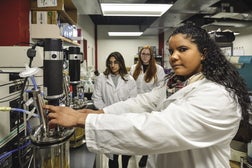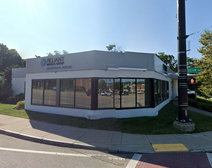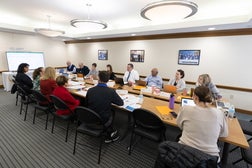Reliant acquisition helps doctors, healthcare costs over long term
Anyone who has talked to Tarek Elsawy since he took over as president and CEO of Reliant Medical Group last year knows one of his primary areas of concern is physician burnout. Not only is the largest independent Central Massachusetts doctor's group running up against a shortage of providers to serve the region's medical needs, but some in the organization are finding the high level of stress and responsibilities put on them by the rapidly evolving healthcare market to be overwhelming. Keeping the increased flow of electronic medical records updated and partnering with insurers to lower costs, aimed at improving the net results, have taken time away from patients.
With these issues impacting the entire medical profession, it makes sense Elsawy's lasting legacy could very well be the sale of Reliant to a division of $185-billion healthcare conglomerate UnitedHealth Group, as it likely would help relieve some pressure. As one of the top 10 largest Central Massachusetts employers with 2,500 workers, it certainly is nerve-racking to think about ceding local control from a board of trustees populated by the familiar faces of area business leaders – such as Kevin O'Sullivan of Massachusetts Biomedical Initiatives and Susan Mailman from Coghlin Electrical Contractors – to a corporate board in Minnesota. However, a Reliant sale has the potential to improve both the lives of its employees and the delivery and cost of health care in the region.
In his first 17 months with Reliant, Elsawy received justifiable praise for streamlining a stagnant organization and getting the most out of employees, resulting in the nonprofit turning a $16-million positive margin in 2016 after a loss of $10 million the year prior. Yet, this operational improvement came as other sea changes face Reliant and the industry. Namely, insurance companies and healthcare policymakers want to curb medical costs, and providers are likely to feel the sting of lower reimbursements. One particular push is for accountable care organizations (ACOs), partnerships where insurers give a set amount of money to providers like Reliant to keep entire populations healthy, rather than a system where sickness is treated as it arises. Massachusetts is making a big bet on this model to help streamline services and contain its state healthcare costs.
ACOs is one area where Reliant's would-be acquirer – Optum (a division of UnitedHealth), with 125,000 employees worldwide – seemingly thrives. A technology and pharmaceutical benefits company, Optum has begun buying clinics and doctor's offices to partner with UnitedHealth Group's health insurance division, moving toward the ACO model while leveraging its technological expertise to improve efficiencies. In the first quarter, Optum's earnings grew 16 percent to $1.3 billion.
With Reliant's potential sale – its board is voting on May 9 – fears over the ceding of local control need to be balanced with the realities of a changing healthcare industry: costs must come down and providers must find further efficiencies. Doctors – in fact, more of them – will still be needed to serve the region's medical needs, and Optum is likely here with the objective of increasing local market share, not just shedding costs. Reliant could eschew the sale and seek to form its own ACO partnership with an insurer, but with an offer on the table from an organization with national scale and built-in efficiencies, an acquisition – as long as it is financially sound – feels like the most attractive option.













0 Comments